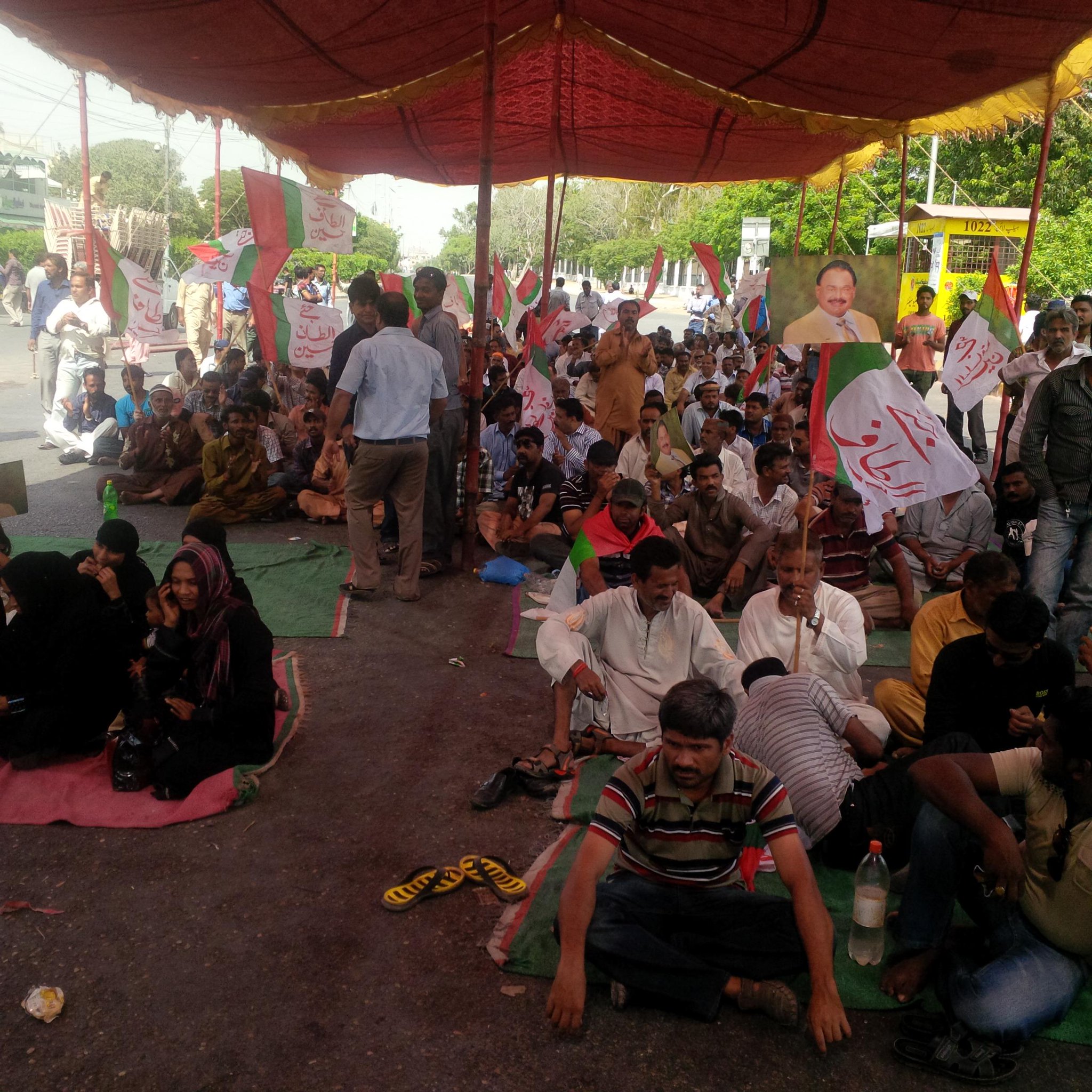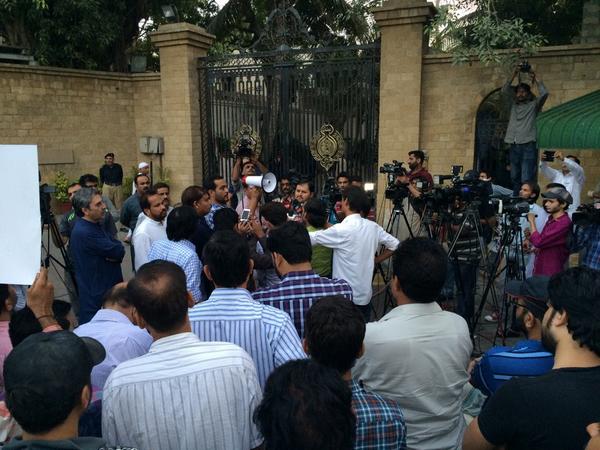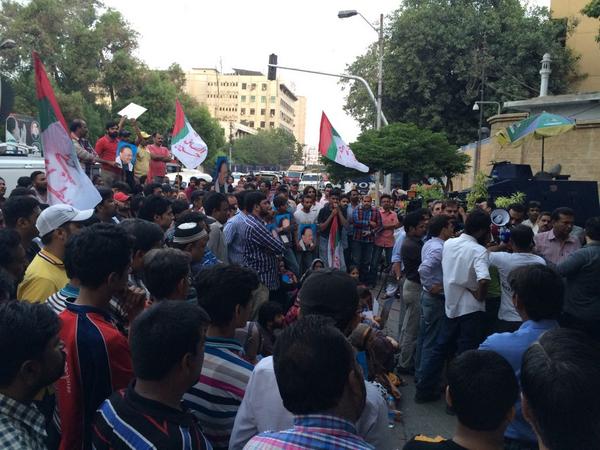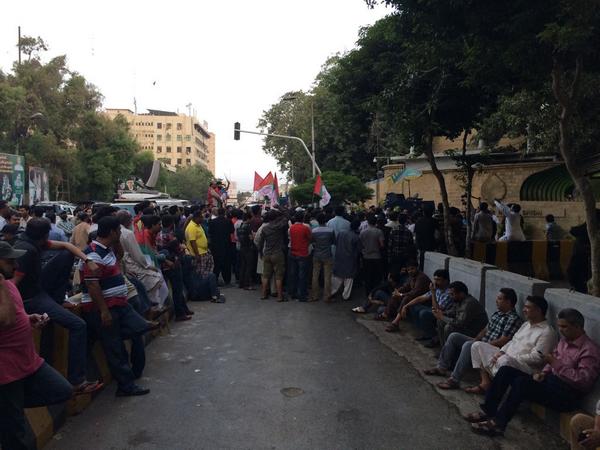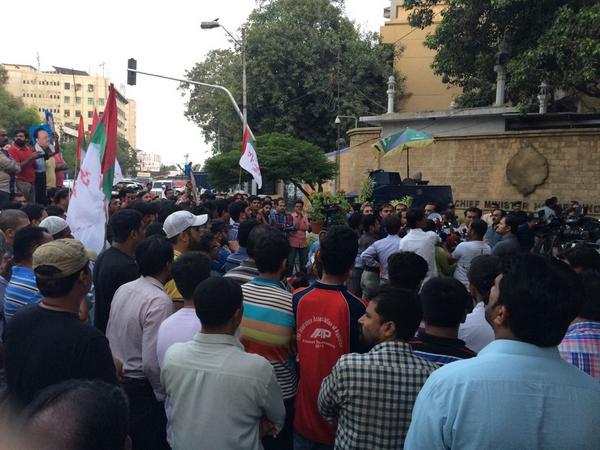ISLAMABAD: Barely in his second year in office, Prime Minister Nawaz Sharif is faced with the difficult choice of picking a new Inter-Services Intelligence (ISI) chief — a decision that could have far-reaching consequences for the already strained civil-military relations.
Director General of ISI Lt Gen Zaheerul Islam, who was appointed as the spy chief in March 2012, is set to retire on Oct 1.
And for many reasons, the sit-ins and the floods have not stopped politicians, journalists and analysts from speculating on who will replace Gen Islam in this key post.
An extension for Gen Islam is highly unlikely; while the government is not too keen on the idea. It is also evident that the military is in no mood to ask for it. No wonder then that speculation is rife on the next man who will hold the position called DG I.
With the control that the head of the ISI enjoys on intelligence gathering within the country and the role the agency has played in Pakistani politics, the filling of the post generally attracts considerable attention.
And at the present juncture, the allegations about ISI having played a role in instigating the dharnas and the general state of the civil-military relations have added to the interest in Gen Islam’s successor.
So who can be a likely candidate?
According to the procedure, the army chief will recommend a panel of lieutenant generals to the prime minister for the latter to make the final choice.
However, at least once in the recent past, only one name was sent to the prime minister.
In 2012, the then army chief retired Gen Ashfaq Parvez Kayani sent only one name — Lt Gen Zaheerul Islam — to the PPP government for appointment as the ISI chief, not allowing the government any choice.
The government, which was recovering from the memogate controversy, accepted Mr Kayani’s proposal without much ado, a general who has now retired, disclosed to Dawn.
And while this time around the appointment will also take place against the backdrop of another political crisis, Army Chief Gen Raheel Sharif is not Kayani and Prime Minister Sharif does not appear to be as willing to acquiesce as the PPP government then did.
But before the identity of the new head is unveiled, there will be another, military related development — five officers will be promoted to the rank of lieutenant generals to fill the vacancies created by the retirement of five lieutenant generals on Oct 1.
Besides Gen Islam, the other four who will hang up their uniforms on Oct 1 are Lt Gen Tariq Khan, corps commander of Mangla; Lt Gen Saleem Nawaz, corps commander of Gujranwala; Lt Gen Khalid Rabbani, corps commander of Peshawar; and Lt Gen Sajjad Ghani, corps commander of Karachi.
Therefore, before the army chief sends a list to the prime minister, he will first be carrying out some in-house promotions. And these newly promoted men could also be in line for the ISI post.
But what sort of considerations will guide Gen Sharif while selecting a panel to send to the prime ministers?
Those who keep an eye on military affairs suggest that the army chief will look at issues such as retirement date, experience of intelligence operations and political inclinations.
Gen Sharif, who has over two years in office, may want an ISI chief who will last as long as his own tenure. If this is how he thinks, eight lieutenant generals will no longer be in the running.
Analysts also suggest that the army chief, who does not have much intelligence experience, may want an ISI chief who is well versed with the system and can adequately assist him in intelligence matters.
Even though DG I technically works under the prime minister and is supposed to directly report to him, the army chief has traditionally been the spymaster’s de facto boss.
In the words of a defence analyst, “Gen Sharif would want a loyalist in office, while Prime Minister Sharif may also be looking for one.”
Extrapolating from this, it can be said that Gen Sharif would prefer a politically neutral officer. Any suggestion or hints of what the government may prefer would not help that particular officer; in fact, it may just kill his chances altogether.
As a matter of fact, if the army chief wants to sideline the government’s preference (provided he has been given a hint) subtly, he can simply appoint the officer for one of the corps commanders positions that will have to be filled before the ISI slot.
However, at the moment, this is simply conjecture as there is no information about whether or not the prime minister has a preference, let alone having expressed it.
In the absence of such information, it can be safely said that Gen Sharif will be looking for someone he can trust and this may be someone he has promoted himself. While he has already promoted one batch recently, the next set will be promoted on Oct 1, as explained earlier.
And analysts feel that it is among these groups that he will look for the men who can fill the critical slot.
It is noteworthy that former ISI, chief retired Lt Gen Shuja Pasha, was given the ISI assignment immediately after his elevation from major general to lieutenant general.
In addition, some observers point out that Gen Sharif has already given some important posts to younger generals — the appointment of Chief of General Staff Lt Gen Ashfaq Nadeem is a case in point.
Once these various considerations are taken into account, those who keep an eye on military affairs suggest that NDU President Lt Gen Javed Iqbal Ramday and DG Rangers Sindh Maj Gen Rizwan Akhtar should be watched. Maj Gen Naveed Mukhtar, who can also be promoted in October, is also one to consider as he has experience of intelligence.
Others likely to be considered are Lt Gen Obaidullah Khattak, Lt Gen Ikramul Haq (who were also promoted by the chief himself) and Lt Gen Zamirul Hassan, who was promoted by Mr Kayani.
However, it is not possible to say more with any certainty.
The final decision, after all, will be made by the men at the top. How few these are and who they finally choose remains to be seen.
New ISI chief to be named soon: report
By Today
RAWALPINDI: The name of a new director general for the Inter-Services Intelligence (ISI) is likely to be announced next week along with the appointment of five new lieutenant generals in the Pakistan Army, a report published.
The prime minister has been considering a couple of names for the top intelligence slot, sources close to the premier told BBCUrdu. Those being considered for the position are Lahore corps commander Lt-Gen Naveed Zaman and President National Defence University Lt-Gen Javed Iqbal Ramday. Meanwhile, names for the slot circulating in military circles are Maj-Gen Nazeer Butt and Maj-Gen Rizwan Akhtar.
Sources privacy to the development told BBCUrdu that Chief of Army Staff General Raheel Sharif wanted to promote certain military officials from the rank of Major General to that of Lieutenant General. These appointments are likely to come before the naming of the new ISI chief so that one of these Lt-Gens may be considered for the top intelligence slot.
The development is expected as current ISI chief Lt-Gen Zaheerul Islam and five lieutenant generals are scheduled to retire from service in the first week of October.
The appointments are coming at a time when the army has been accused of meddling in politics and although the retirements and subsequent appointments do not appear suspect, they are drawing much interest particularly on account of their timing.
The military officers retiring in October include ISI chief Lt-Gen Zaheerul Islam, Mangla corps commander Lt-Gen Tariq Khan, Gujranwala corps commander Lt-Gen Saleem Nawaz, Peshawar corps commander Lt-Gen Khalid Rabbani and Karachi corps commander Lt-Gen Sajjad Ghani.
All five positions are of paramount importance in the military but the chief of the ISI is regarded as the army's most important official after the army chief himself. The ISI chief is appointed by the prime minister, traditionally on the advice of the army chief.
The report added that a dialogue is underway between the Prime Minister House and the General Headquarters on the ISI chief's appointment. However, close aides of the prime minister have said that no formal discussion has taken place between the premier and the COAS on the matter. They added that General Raheel is expected to meet Prime Minister Nawaz Sharif prior to appointing the five Lt-Gens.
Gen Zahir to replace Pasha in ISI
Published Mar 10, 2012 01:53am
Pakistan appointed Lt. Gen. Zahir ul Islam as new head of intelligence on Friday. – AP Photo
ISLAMABAD: The government has appointed Lt Gen Zahir ul Islam as the next head of Inter-Services Intelligence (ISI), the country’s premier intelligence agency, ending speculations about giving another extension to Lt Gen Shuja Pasha.
“Prime Minister Syed Yousuf Raza Gilani has appointed Lt General Zahir ul Islam as new Director General Inter Services Intelligence (ISI),” a brief statement issued on Friday by the prime minister’s office said without giving further details.
His appointment was made on the recommendation of Army Chief Gen Ashfaq Parvez Kayani.
Gen Islam, who is currently the Commander of V Corps, Karachi, will take charge of his new assignment on March 18 when Gen Pasha will retire after heading the ISI for over three years.
Gen Pasha’s strong loyalty to the army chief earlier won him two one-year extensions in 2010 and 2011.
The position of the Commander of Karachi V Corps will be filled by Lt Gen Ejaz Chaudhry, currently the Director General of Rangers, Sindh.
Meanwhile, it is learnt that Maj Gen Rizwan Akhter, the Commander of South Waziristan, is likely to move to Karachi to take over Gen Chaudhry’s position at the Sindh Rangers.
The appointment of Gen Islam, who previously headed the ISI’s internal wing under Gen Pasha for almost two years, signals continuity at the ISI as Afghan peace and reconciliation efforts are picking momentum and coalition forces are scheduled to complete their withdrawal by 2014.
The change of guard at the ISI takes place almost at the same time as the parliamentary review of ties with the US in the aftermath of last year’s Salala attack, is tentatively planned to be completed marking the start of a new phase of ties with Washington.
Technically, ISI has little to do with conduct of relations with the US, but because of the ongoing intelligence cooperation between Pakistan and the US, both CIA and ISI play a determining role in the bilateral relationship.
Gen Pasha had taken command of the ISI on a high note and was seen by the US as someone who had strong anti-Taliban views and could reorient the spy agency accused of maintaining close contacts with Taliban. But, as the CIA-ISI cooperation ran into problems, the Americans appeared to be less enthusiastic about him.
Gen Pasha came under intense criticism at home after Osama bin Laden’s denouement last year for his agency’s failure to detect Al Qaeda chief living close to the Pakistan Military Academy in Kakul and more significantly for not being able to know that the Americans planned to carry out an operation deep inside Pakistan to take out the fugitive terror outfit leader.
Addressing an in-camera session of parliament, Gen Pasha had then offered to step down.
The outgoing ISI chief’s role in the memo-gate made him more controversial.
Following Mansoor Ijaz’s disclosure in an article in the Financial Times, Gen Pasha travelled to London to see him (Mansoor Ijaz) without the approval of the prime minister, who is technically his boss.
Later, Gen Pasha pressed for probe into the memogate by a Supreme Court appointed commission against wishes of the government which wanted the investigation to be carried out by the bi-partisan parliamentary committee of national security.
Mr Ijaz, who is now a star witness in the memogate, had also alleged that Gen Pasha had visited Arab countries to seek support for a coup in the aftermath of the US raid on the OBL residence in Abbotabad.
Another extension for Gen Pasha was opposed by the main opposition PML-N.
The new ISI chief, who has a little over two years in active military service (till Oct 2014) is said to be a typical infantry soldier.
He is from the Punjab regiment and has held several high-profile positions. He was the Chief of Staff at the Army Strategic Forces Command from 2004-2006.
For the next two years (2006-2008) he commanded the 12th Infantry Division based in Murree. Moving to ISI in 2008 he was assigned the internal wing, where he was responsible for internal security, law and order, coordination with law-enforcement agencies and supporting counter-terrorism operations. As the Commander of V Corps he oversaw an operation launched in Karachi after last year’s ethnic violence.
ISI and its former chiefs enjoy immunity, says US
Six Americans were among the 166 killed in the Nov 26, 2008, terrorist attacks in the Indian city and later their relatives filed a case in a New York court, listing two former ISI chiefs among the accused. —AFP Photo
WASHINGTON, Dec 19: The US State Department has informed a New York court that Pakistan’s Inter-Services Intelligence and two of its former directors general “enjoy immunity” and cannot be tried in the Mumbai terror attacks case.
“Upon consideration of this matter, and after a full review of the pleadings, the Department of State has determined that defendants Ahmed Shuja Pasha and Nadeem Taj are immune from suit in this case,” said an official letter sent to the US Department of Justice.
The State Department also pointed out that its determination was “not subject to judicial review”.
India, however, rejected the determination, saying that the US affidavit was “a matter of deep and abiding concern” and contradicted Washington’s public commitment to bringing “those responsible for the Mumbai terror attacks to justice”.
Six Americans were among the 166 killed in the Nov 26, 2008, terrorist attacks in the Indian city and later their relatives filed a case in a New York court, listing two former ISI chiefs among the accused.
Lashkar-e-Taiba leaders, Mohammed Hafiz Saeed, Zakiur Rahman, Sajid Mir and Azam Cheema are on the same list.
The complainants claimed that since the ISI was involved in the planning and execution of the attack, Mr Pasha and Mr Taj should be asked to appear before the court.
But on Dec 17, a State Department legal adviser, Harold Hongju Koh, informed the Department of Justice of its determination that both Mr Pasha and Mr Taj enjoyed immunity and, therefore, could not be called to a court in the United States.
“The residual immunity of a former official is based upon that official’s conduct and extends only to acts that individual took in an official capacity,” explained Mr Koh in a letter addressed to the US Principal Deputy Assistant Attorney General Stuart Delery.
On Dec 17, Mr Delery submitted a 12-page affidavit in the court, saying: “In the view of the United States, the Inter-Services Intelligence is entitled to immunity because it is part of a foreign state within the meaning of the Foreign Sovereign Immunities Act.”
The Department of State has also determined that the two former ISI chiefs were also “immune because plaintiffs’ allegations relate to acts that these defendants allegedly took in their official capacities as directors of an entity that is undeniably a fundamental part of the government of Pakistan,” he said.
“Because foreign sovereign immunity and foreign official immunity provide an adequate basis upon which to dispose of this case … the United States takes no position on the political question doctrine issues that are also presented in this case,” he added.
“In making this immunity determination, the United States emphasises that it expresses no view on the merits of plaintiffs’ claims. The United States strongly condemns the terrorist attacks in Mumbai and continues to believe that the Islamic Republic of Pakistan must take steps to dismantle LeT and to support India's efforts to counter this terrorist threat,” the affidavit said.
A lawyer representing the ISI and its two former chiefs informed the court that the agency was a part of the Pakistani government and functioned under the Ministry of Defence.
The lawyer disagreed with the plaintiffs’ claim that the ISI was “not governed or authorised by Pakistani law” and was “not under the control of the Pakistani government”.
The US executive and legislative branches had “consistently treated the ISI as part of the Government of Pakistan,” the lawyer pointed out.
“The executive branch holds official meetings with representatives of the ISI, issues them diplomatic visas consistent with their status as Pakistani government employees and in all respects recognises the ISI as part of the Government of Pakistan,” the lawyer said.
“Congress likewise has specifically recognised that the ISI is part of the Pakistani government,” he argued.
The attorney also noted that so far no US court had concluded that a component of a foreign state lacked immunity because the foreign state allegedly did not control its actions.
“Plaintiffs’ theory is particularly unusual in the context of an intelligence agency, which, like a foreign ministry or defence ministry, serves a quintessentially sovereign purpose,” he argued.
